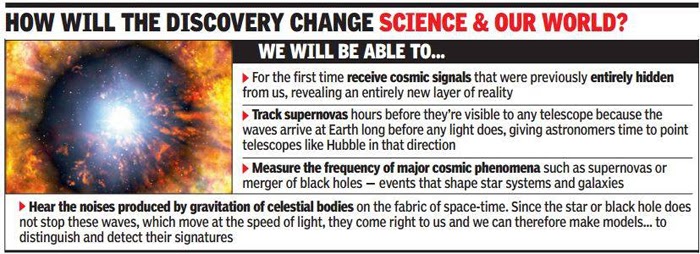Gravitation Waves: An Explainer:
Scientists across the world are giddy at the prospect that the final piece in the puzzle emerging from Einstein's theory of general relativity will fall into place on Friday.
Every single prediction from Einstein's 1915 theory has been proven by direct experimental evidence - except one: the existence of gravitational waves.
Einstein's theory upended Newton's understanding of gravity by showing that matter and time were inextricably linked. Rather than gravity being an instantaneous attraction between objects across infinite space, Einstein showed that space-time was the four-dimensional structure of the universe whereby matter, energy and gravity were all mediated through space-time, with interactions limited to no faster than the speed of light. Gravitational waves are an inevitable conclusion drawn from this theory. Gravitational waves are tiny ripples in the fabric of space-time. Gravity is such a weak force that these ripples are so small as to be nearly impossible to detect. It would take a massive event in the fabric of space-time for us to be able to detect them, an event such as the collision of black holes.
If a gravitational wave passed through your head, you wouldn't notice it - but what it would do is to stretch your head ever so slightly one way while simultaneously squeezing it the other, then vice-versa.

How slightly?
Well the experiment designed to directly measure these waves comprises two sets of four-kilometre long laser arms set perpendicular to each other in an L-shape. Scientists expect that the impact of a gravitational wave on this set-up will stretch the arms by a distance so small it is less than 10,000 times smaller the width of a proton. LIGO stands for Laser Interferometer Gravitational-Wave Observatory. It has very, very accurate measuring devices.

Some scientists are cautious. In 2014, a team of physicists running the BICEPs experiment announced that they had discovered gravitational waves resounding in the echo of the Big Bang. They hadn't. The journal Nature famously scotched this in January 2015 with the headline "Gravitational waves discovery now officially dead".
Some information in pictures format:


No comments:
Post a Comment